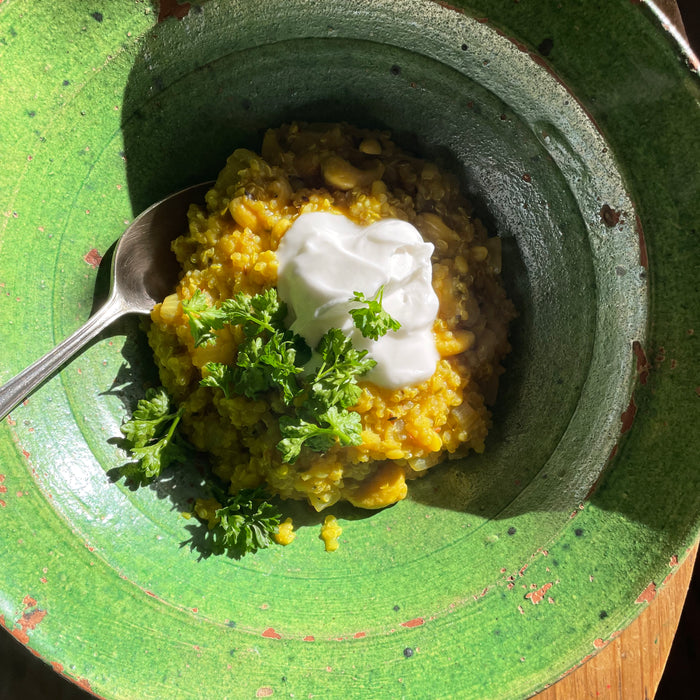Quinoa Cashew Moong Dhal Pilaf


Abhyanga is the soothing and healing practice of Ayurvedic self-oil massage that is an important part of an Ayurvedic daily routine. It is a deeply nourishing practice that holds countless benefits for the body, mind, and spirit. Abhyanga grounds us into the body, calms our nervous system and is particularly helpful in pacifying vata dosha.
Not to mention – it is the most beautiful act of self-love. We all know the healing power of touch and creating this ritual for yourself can be the a beautiful practice of self-care.
Calms, supports, and strengthens the nervous system
Reduces anxiety, stress and can improve our sleep.
Enhances circulation and moves lymph in the body
Supports to the removal of toxins and can improve digestion & elimination.
Lubricates the skin and creates overall lustre, strength, and softness.
Slows the ageing process and increases longevity.
Strengthens and tones our muscles and tissues
Creates resilience in the body and boosts our ‘Ojas’ or immunity
Abhyanga is recommended daily or at least 2-3 times a week. It is traditionally practiced in the morning as a part of an Ayurvedic daily routine, after a meditation and yoga practice and before breakfast. However, it can also be done in the evenings to wind down & support your sleep or generally any time except right after eating.
The practice can be as short as 5 minutes or as long as 20-30 minutes depending on the time you have available. The most important thing to do is be slow, mindful, and present with the practice.
Find a private space that is warm and inviting where you are free from distraction. Lay down a towel on the floor beneath you that you have designated to be your ‘oil towel’ – it will get oily!
Using an oil of your preference, warm about ¼- ½ cup of oil (or maybe even more) either over the stove or by placing a cup of oil in a body of boiling water. Ayurvedic massage really is all about the oil and more than just simply moisturising so be liberal!
Using the palms of your hands, apply and massage the oil into your body starting from the top of your head down to the soles of your feet. Begin in this order:
Cold pressed black sesame oil is Ayurveda’s favourite oil and used for most Ayurvedic treatments. This is a wonderful oil to begin with.
Although, the type and amount of oil you use can also vary depending on your Ayurvedic constitution, the season, or the environment you are practicing in. Here are some variations you can try:
Pitta Dosha / Summer – coconut oil for its cooling and hydrating quality.
Vata Dosha / Autumn to Winter – cold pressed black sesame oil for its heavy and grounding quality.
Kapha Dosha / Late winter – Spring – sweet almond oil for its light and warming quality.
Special thanks to our Ayurvedic Health writer, Emily for this article @emilycartonwellness.